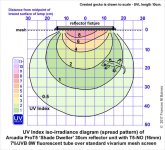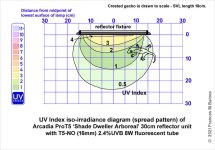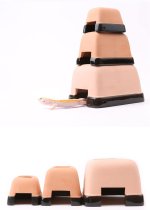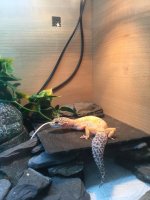#174---Observations Regarding Gecko Supplement Frequency versus Zoo Med's Natural ADULT Bearded Dragon Food as a 24/7/365 Cricket Dry Maintenance Diet since 2015 . . . . . . Elizabeth Freer -- 5 October 2024 (update)
My Zoo Med's Reptivite multivitamins
withOUT D3 (
ordered from Amazon in May 2023) expires January 9, 2026!

Feeder variety is best! It's also important to feed crickets a nutritious diet 24/7/365 prior to feeding them to your geckos. For this '
maintenance diet' I've used
finely ground Zoo Med's Natural ADULT Bearded Dragon Food for over 9 years. Some gecko keepers also gut load bugs & worms they're about to feed off for 24-48 hours prior to feeding them to gecko(s). A '
gut load diet' means feeding those bugs & worms a
high calcium carbonate diet to approximate a resulting 1:1 calcium : phosphorus ratio.
Since 2015 (per HMP) I've
finely ground Zoo Med's Natural
Adult Bearded Dragon Food for my crickets' & lately mealworms'
24/7/365 dry food
. ZMN Adult BDF has definitely 'built' better bugs & created more nutritious crickets & sometimes mealworms for my geckos. In addition, I feed crickets & mealworms sliced carrots for beta-carotene & sometimes sweet potatoes
several times per week. The more often the better!!!
I
usually dust
Zoo Med's Repti Calcium with D3 on half or all geckos' crickets @ weekly feedings
except for my 21 year old, captive hatched,
Ptychozoon kuhli Sara.
Scroll to link 184 for USA Petco stores now having .28 oz. expiration-dated packages of
Zoo Med's Reptivite Multivitamins with D3:
#178---Open Letter to the EU Commission for Exception to Ban on Lighting Products for Animal Welfare (pdf - version 1) -- 20 September 2023 Thanks for sharing, Sarina Wunderlich & Digs, on 20 September 2023! Click...
www.geckosunlimited.com
\/ \/ \/ \/ \/
*** Correlophus ciliatus Melody gifted me male crested gecko George in January 2008. George hatched September 2002. That makes George 22 years old as of September 2024. Initially Melody & I fed George dusted crickets. Now George eats
Pangea with Insects dry diet mixed with water usually @ 2 feedings per week.
Lowest SAFE night temperature drop for crested geckos:
Recommended by
Courtney Ann Lee, Moderator on Crested Gecko - Advancing Husbandry's facebook group
On 26 March 2024 Courtney suggests:
"Judging by New Caledonia's average weather patterns never/extremely rarely dropping below 55°F I'd say that's your bottom end, but I'd personally go with 60°F to be on the safe side."
On 29 March 2024 Reptifiles' Mariah Healey suggests:
"In New Caledonia, nighttime temperatures average no lower than 59°F during winter. Reputable guides generally recommend no lower than 65°F at night. In my own experience, my bedroom where my crestie is kept can get as cold as 62°F at night, and he doesn't seem to have suffered any ill effects from it (it's worth noting that he has access to short-wave infrared and UVB as part of his setup, which increases a reptile's resilience to cold temperatures)."
*** Cyrtodactylus zebraicus (Thai Ocelot geckos): Consistently required Zoo Med's supplements @ 3 feedings per week throughout the 2017-2018 breeding season of a 1.2 (male ID1 & females ID2 & ID4) in addition to eating crickets fed ZM Natural
Adult BDF as a 24/7/365
maintenance diet -- neonates included.
***** Cyrtodactylus zebraicus females are exceptionally prone to calcium crashes whether or not they're producing eggs!!!
As strongly advised by EU breeder Georg Simon on 15 September 2015:
"Most importantly offer them sepia skulls (cuttlebone) in small crumbs, not just powder (!!!), in a small bottle cap 24/7/365. They will eat sepia skulls (cuttlebone) pure!" An alternative may be Zoo Med's pure calcium carbonate. Include sepia skulls (cuttlebone) or Zoo Med's pure calcium carbonate in a bottle cap in ALL hatchling enclosures as well as in ALL female enclosures! Remove this 24/7/365 sepia skull (cuttlebone) OR pure calcium carbonate bottle cap from young males' enclosures when their genders become evident.
KEEP this bottle cap inside females' enclosures their entire lives! *****
2024 Cyrtodactylus zebraicus 2nd breeding season begins: During the 2024 season I introduced Frank Colacicco's February 2015 female ID4 to Jens Felka's younger male ID5 once from March 24 to April 1. My second attempt to pair ID4 with ID5 was from May 28 to June 9. (Jim's 6 April 2024 message: Jens' ID5 nicely patterned male was one of the bigger ones from Jim's September 2019 Jens Felka's Hamm, Germany export of eight Cz geckos. So
probably ID5 was a late 2018-early 2019 winter hatch.) Eggs may appear within 4-6 weeks, usually 5 weeks.
My first
Cyrtodactylus zebraicus (ID1) is a Derek Dunlop male who hatched 26 August 2011 & is now 13 yo.
*** Eublepharis macularius Received female leopard gecko Cha in June 2006; ~19 years old. Because of 3 uncharacteristically
difficult sheds (~11 November 2022, 6 April 2023, &
~26 December 2023) my leopard gecko
may need retinol beyond the crickets she regularly eats. Those crickets always eat
finely ground ZMNABDF 24/7/365 as a maintenance diet. Beginning
8 April 2023, I'll dust Cha's first (
3 4) 5 medium crickets
each week with
Zoo Med's Reptivite multivitamins withOUT D3 & then subsequently dust 5-6 additional medium crickets 2 days later with
Zoo Med's Repti Calcium with D3.
At Cha's 7 February 2024 vet visit: Cha weighed 55 grams. Since then I've added a 6 inch diameter shallow lid of water (Husky Deli ice cream container lid) as a pool for hydrating & drinking. That's in addition to an 8 ounce water dish + a 2 ounce ceramic drinking bowl. About one week ago I added sliced carrots to the crickets' diets several times per week.
Rest in paradise, Cha, on 8 July 2024. 19 years was all you had. Your last couple years got more difficult with each passing day.
 *** Ptychozoon kuhli
*** Ptychozoon kuhli (female flying/gliding gecko Sara; captive-hatched date: 6-25-2003): At least for the last several years my 21 year old
Ptychozoon kuhli female has not been given
any powdered supplementation in her diet! I discontinued dusting 1/5 crickets per month with Zoo Med's Reptivite Multivitamins without D3 on 11/28/2023. On 31 December 2023 I resumed dusting 1/5 medium crickets per month with Reptivite Multivitamins withOUT D3 @ 1 feeding per month.
I'll continue dusting Reptivite withOUT D3 @ 1 feeding per month on 1/~5 crickets! The rest of the month her 4-5 weekly crickets are plain -- NO supplement dusting.
Sara is being handfed @ the present time. Her right eye is cloudy. This may be a cataract.
5 October 2024 Addendum (EN): There are doubts regarding
Ptychozoon kuhli 's reclassification into the
Gekko genus
!!!
*** Lepidodactylus lugubris (Mourning geckos):
Now fed Pangea with Insects dry diet mixed with water. On 4/23/2024 I sent 8
Lepidodactylus lugubris to their north Seattle home via FedEx Priority Overnight shipping. 8
Lepidodactylus lugubris were rehomed in a school classroom. I have 1 left. <3
I had kept
Lls since August 1988 when I caught 3 hatchlings on the Kiahuna Plantation Resort in Kauai, Hawaii.
Lls were my first geckos. At that time it was OK to fly them from Kauai to Seattle as seatmates!
 *** Oedura castelnaui
*** Oedura castelnaui (Northern Velvet geckos): At this time I usually
lightly dust 2 of 4 medium crickets I feed most my
Oedura castelnaui with Zoo Med's Repti Calcium with D3
once per week.
In early June 2024 I added 2 crickets dusted with Zoo Med's Reptivite multivitamins withOUT D3 @ 1 feeding per month.
In September 2000 @ the Puyallup, Washington reptile show I purchased my first Oc (male Matiyos) from his breeder Julie Bergman. At that time Matiyos was roughly 18 months old. So as of September 2024 Matiyos = 25 years old +! Matiyos is in good shape!
*** [
Phelsuma barbouri (Barbour's Day Geckos)]: Kept all
P barbouri under Zoo Med's 5.0 T8 UVB tubes (replaced annually), halogen puck bulbs (on rheostats), & Aubuchon Hardware's Westek 8 watt, 13 inch, Ultra Light fluorescent tubes (for
sanseveria). Kept one Jerry Peebles' female since the early 2000s in a 15 inch long enclosure. In May 2020 this female had eye surgery to remove one
possibly retained spectacle. She did not survive this surgery. RIP - May 2020. Last male, an older
barbouri, was a gift from Adam Jessien. This male
barbouri passed away during Spring 2021 (with vent issues perhaps from adding
dated bee pollen/strawberry powder to his crickets' diets)???
*** Phyllurus platurus (Southern Leaf-tailed gecko; keeping a Joe Hupp male since 2013
): At this time I
lightly dust 2 of 3 medium crickets I feed my male
Phyllurus platurus with Zoo Med's Repti Calcium with D3 crickets once per week. Then at 1 feeding per month
lightly dust 2 of 3 crickets per month with Zoo Med's Reptivite multivitamins withOUT D3 instead of Repti Calcium with D3.
In a nutshell as of 5 October 2024 here are my 18 geckos:
0.1 captive-hatched
Ptychozoon kuhli who is 21 yo
1.0
Correlophus ciliatus who is 22 yo as of September 2024. Gift from Melody in January 2008.
5.2
Cyrtodactylus (
peguensis)
zebraicus with the oldest male @13 yo from Derek Dunlop
1.0
Phyllurus platurus (Joseph Hupp breeder) Had 11 years
7
Oedura castelnaui including my first Oc (male Matiyos) from Julie Bergman. Matiyos = 25 years old + as of September 2024.
+ 1 parthenogenetic
Lepidodactylus lugubris
Rest In Paradise: My 0.1
Eublepharis macularius (leopard gecko) passed away on 8 July 2024 @ 19 yo.













